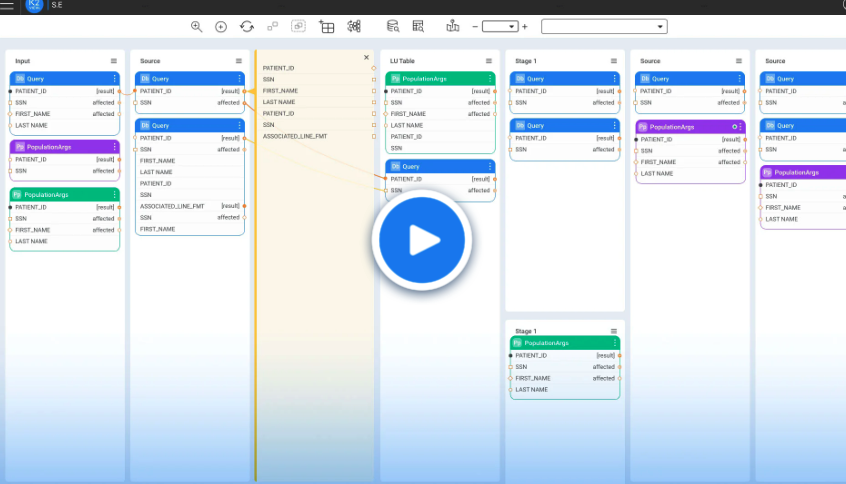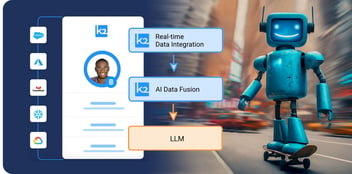RAG chatbots are AI-powered apps that combine retrieval and generation models to provide more accurate and relevant responses than traditional chatbots.
What is RAG?
RAG stands for Retrieval-Augmented Generation, a Generative AI (GenAI) framework that augments Large Language Models (LLMs) with internal data to help AI-powered software, like chatbots, communicate more effectively with people.
An LLM is an advanced Machine Learning (ML) model designed to respond to text-based queries with accurate answers. Since an LLM is only as smart as the data it’s trained on, it needs to be updated regularly. That’s where RAG comes in.
According to analyst Gartner RAG enables AI to respond with the most relevant and up-to-date data and information, because fresh, trusted data can instantly be retriev ed from internal sources such as document databases or enterprise systems.
RAG Chatbot Examples
When users want a quick answer to their questions, chatbots can be very useful. Because conventional bots are configured to respond to a relatively small amount number of possible inquiries (called “intents”), they’re usefulness is limited – and potentially frustrating to users.
RAG can make conventional bots more intelligent by enabling the LLM to provide answers to questions that aren’t on the intent list.
Imagine a mobile phone operator’s chatbot engaging with a client on the operator’s website. The client reports that her internet is down, and the chatbot responds with generic step-by-step instructions to check the router, cables, and connections.
Now imagine a different scenario. As soon as the client starts the interaction, the chatbot accesses real-time customer data from the underlying information systems, including network data. It learns that there’s a hardware failure affecting all consumers in the neighborhood, and immediately offers an ETA and an SMS notification for service restoration.
Other examples include:- Customers inquiring about new product updates that were just released
- Travelers requesting a flight upgrade using frequent flyer miles on a specific flight
If there’s one thing that all chatbot users have in common, it’s that they NEVER want to receive misleading information (called hallucinations).
The Q&A nature of chat interactions make bots an ideal use case for GenAI because understanding the context of a question leads to a more accurate and relevant response. In fact, chatbots are a great entry point for implementing RAG in an organization.
Data Products Energize RAG Chatbots Even Further
When all’s said and done, it’s difficult to deliver strategic value from GenAI because LLMs:
| Lack business context |
Train on stale data |
Are expensive |
Generate hallucinations |
Data products – reusable data assets that bundle data with everything needed to make them accessible by authorized consumers – empower RAG by preparing and injecting trusted, fresh, and contextual enterprise data into the LLM, when a user prompts the RAG chatbot.
The data product can be invoked by the RAG framework to:
- Retrieve and integrate the necessary customer data from the enterprise data sources, in real time
- Translate it into a contextually rich prompt
- Feed it to the LLM along with the client’s query
The LLM then generates an accurate and personalized response for the user.
The data product employs various methods of accessing customer data in real-time: APIs (if they exist), CDC, messaging, streaming – or any combination of these methods to integrate data from disparate data sources.
Combining RAG with real-time data products is ideal for use cases other than chatbots, such as:
- Accelerating issue resolution
- Creating hyper-personalized marketing campaigns
- Generating personalized cross-/up-sell recommendations for call center agents
RAG Chatbots and Beyond
Today, RAG chatbots are primarily used to deliver reliable, contextual, and quick answers to questions.
In the future, they might be used to recommend appropriate actions to user prompts and contextual information.
For example, if today the army is using chatbots to inform veterans about academic aid and related programs, in the future it might list eligible colleges, and even suggest courses based on the applicant’s military training and previous experience. They may even be able to generate the financial aid application itself.
As technology evolves, we can expect to see rapid advances in RAG via data products, as well as an expanding list of the use cases they empower.
Advances will likely include data products that can process larger volumes of data in milliseconds, handle both tabular data and unstructured documents, and generate prompts that are optimized for the industry as well as for specific use cases.
An enterprise RAG solution powered by data products promises to elevate the customer experience to new levels.
Discover the K2view Data Product Platform.












